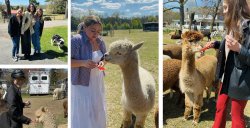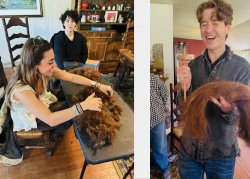Students Experience Farm-to-Fiber Process in ARTX298 Textiles Course
Posted in: Announcements

In a hands-on exploration of textile production, students from Montclair State University’s ARTX298 Textiles course embarked on an educational field trip to a local fiber farm, where they gained invaluable experience in the life cycle of textiles—from animals to yarn. Led by Professor Julie Panchu, the class researched the physical and chemical properties of textile fibers, and their journey to the fiber farm brought these concepts to life.
At the farm, students were introduced to the animals that produce the fibers used in textile creation, such as alpacas, sheep, and goats. The day began with lessons on animal care, where students learned how proper nutrition and nurturing affect the quality and types of fibers each animal produces. The farm owners explained that animals need over a year of care before shearing, and students had the chance to see this process firsthand. Watching the animals being sheared allowed students to witness the first critical step in fiber production.

The experience didn’t stop there. After collecting the natural fibers, students got to work carding and combing the yarn before spinning it on a spindle, transforming raw fibers into a beautiful yarn bundle. The hands-on activities continued with some students learning how to felt wool, wrapping wool yarn around soap and immersing it in water to create a unique felted soap.
Students expressed excitement about the immersive learning experience, with many noting that seeing the full fiber process in person helped solidify what they had learned in class. “It was incredible to see how the different steps—carding, combing, and spinning—came together. It gave me a deeper understanding of how fabrics are constructed,” one student remarked.
This trip was designed to emphasize sustainability and the environmental implications of textile manufacturing, a key focus of ARTX298. By connecting farm-to-fiber concepts learned in the classroom with real-world practices, the trip offered students a comprehensive understanding of how fabrics are constructed and finished, and how these processes impact their aesthetic and performance characteristics.
Professor Panchu, who brings 15 years of experience in Color/Fabric R&D and Trend Forecasting at fashion powerhouses like Ralph Lauren, Gap, and DKNY, has always prioritized giving students practical industry insight. “This visit allows students to grasp the full cycle of textile production, from the farm to the finished fiber,” said Professor Panchu. “It’s important for them to connect the classroom theory with real-world practices, especially when it comes to sustainability in textiles.”
The laboratory component of ARTX298 reinforces these hands-on skills, guiding students through methods of identifying and analyzing textile materials and structures. By using industry-standard terminology throughout the course, students gain the ability to communicate effectively within the fashion industry.
In sum, this fiber farm experience gave the students a unique and amazing opportunity to understand the life cycle of textiles and the intricacies involved in the journey from fiber to fabric. With a renewed appreciation for the craftsmanship behind textile production, students returned to Montclair State University ready to continue their studies with a deeper understanding of sustainability and fiber production.

